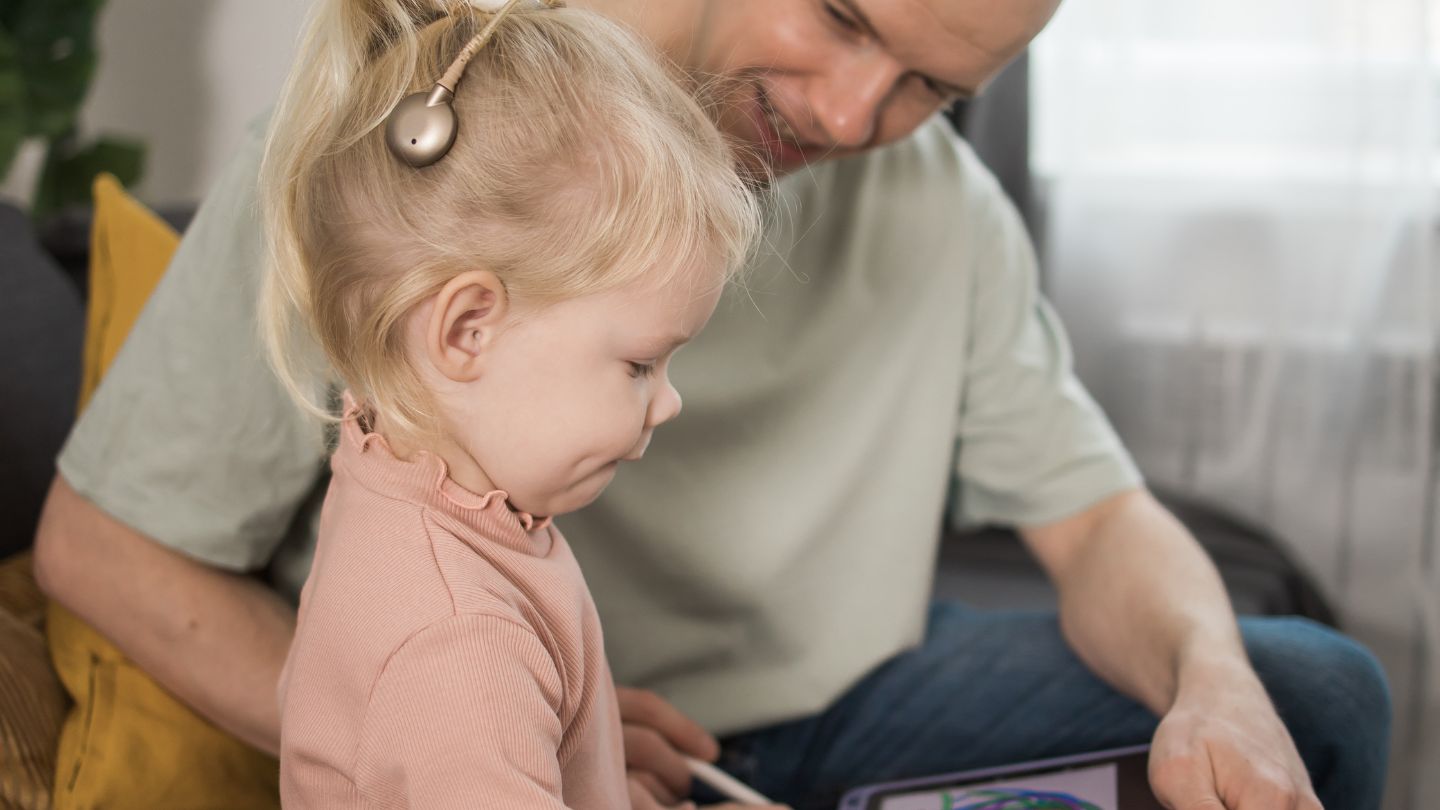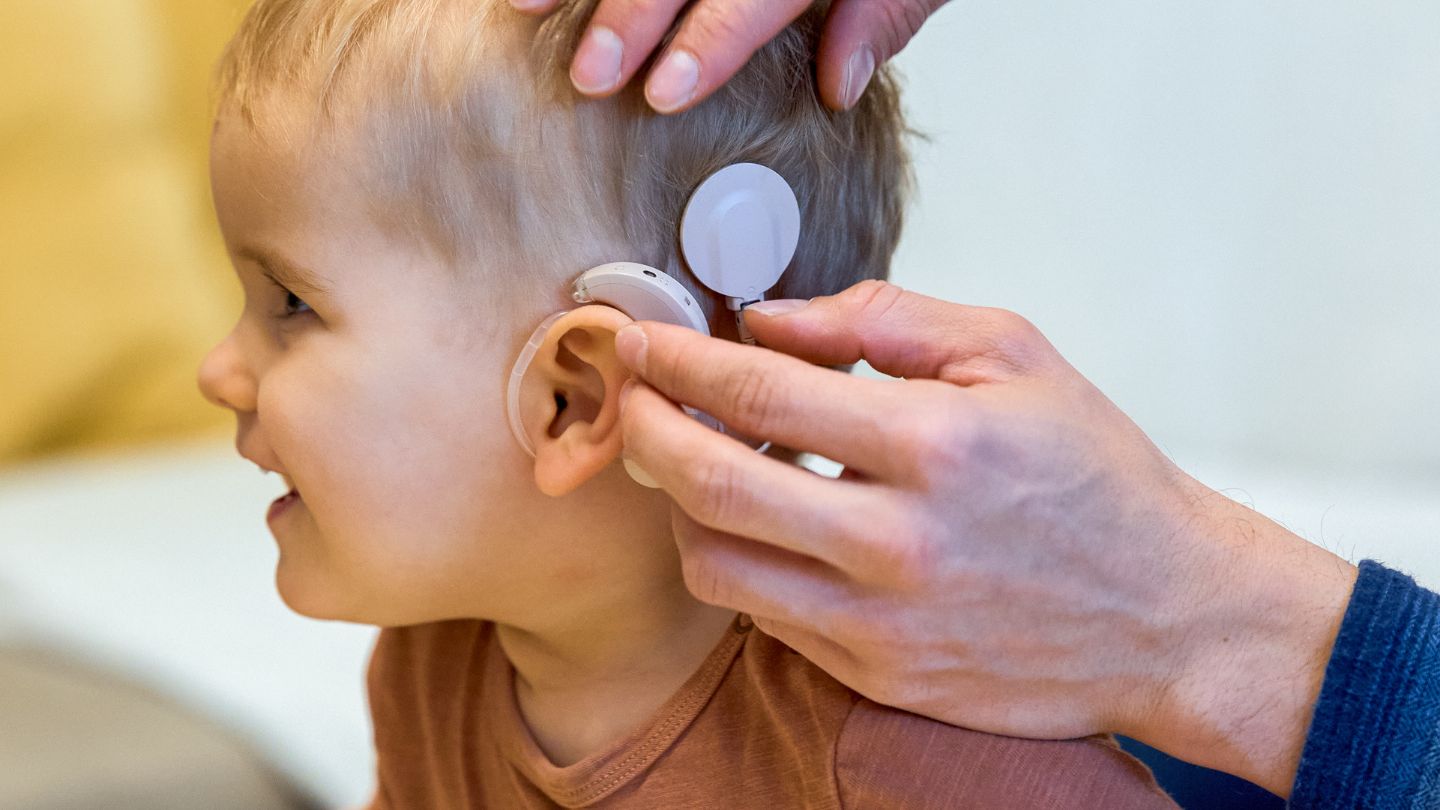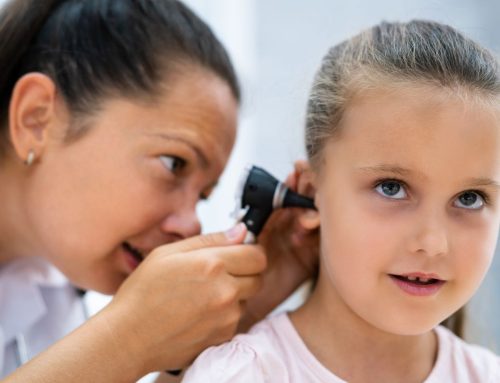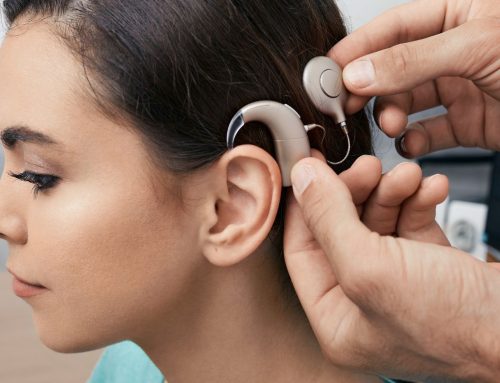Who qualifies for pediatric cochlear implants? Children with severe to profound hearing loss who meet specific age and medical criteria. This article details these eligibility factors and the evaluation process.
Key Takeaways
- Pediatric cochlear implants are designed for children with severe to profound bilateral sensorineural hearing loss, providing crucial auditory awareness beyond the capabilities of hearing aids.
- Candidacy for cochlear implants requires thorough evaluation of age, type of hearing loss, and any medical conditions, emphasizing early intervention for optimal outcomes.
- Long-term support and individualized rehabilitation are essential for maximizing the benefits of cochlear implants, improving children’s communication skills and social integration.
Understanding Cochlear Implants
Cochlear implants serve as a remedy for children with severe to profound hearing loss, functioning by circumventing the damaged regions of the cochlea and delivering electric pulses directly to stimulate the auditory nerve. This innovative solution offers children who do not experience improvement with hearing aids an opportunity to perceive sounds and gain audio clarity, simulating normal auditory function through activation of nerve fibers responsible for hearing.
The advantages of cochlear implants are more than simply restoring auditory functions. Children outfitted with these devices typically observe advancements in their ability to communicate, which, in turn, can bolster educational performance and social engagements.
Implementing intervention strategies promptly is crucial for developing vital language abilities and social competencies. Customized specifically to align with each child’s unique requirements, cochlear implants unlock new opportunities by enhancing listening capabilities.
Candidacy for Pediatric Cochlear Implants
To qualify for cochlear implants, there are certain qualifications that must be met to ensure optimal results. This includes having a severe to profound bilateral sensorineural hearing loss, which indicates that both ears suffer from significant hearing impairment and traditional hearing aids do not provide adequate assistance.
A comprehensive evaluation process is conducted with the objective of pinpointing those children who stand to gain the most from this groundbreaking technology in restoring their ability to hear.
Age Requirements
Age is a critical factor in determining eligibility for cochlear implants. The latest FDA-approved minimum age for pediatric cochlear implantation is 9 months, with evidence showing that children as young as 6 months can benefit from the procedure. Research shows that children implanted before age three have significantly better auditory outcomes, emphasizing the advantages of early intervention.
Children with single-sided deafness typically become candidates for cochlear implants starting at age 5. Overall, the age range for cochlear implantation spans from 0.6 to 18 years, emphasizing the importance of early identification and intervention to optimize language development and auditory skills.
Type of Hearing Loss
Determining whether a child is suitable for cochlear implants greatly depends on the type of hearing loss they experience. Children with severe to profound sensory hearing loss in both ears are potential candidates. This kind of hearing impairment suggests there’s damage within the inner ear or to the auditory nerve itself. According to FDA guidelines, children who have bilateral profound sensorineural hearing loss meet the criteria for pediatric cochlear implantation.
The evaluation process heavily relies on audiometric thresholds as a measure for consideration. For example, when unassisted pure tone averages exceed 60 dB HL (decibels Hearing Level), it typically warrants an assessment for a possible cochlear implant procedure. If speech recognition improves significantly using cochlear implants over traditional hearing aids at thresholds above 82 dB HL, it highlights why thorough and proper evaluations are imperative before proceeding with cochlear implantation.
Read more : Cochlear Implants vs Hearing Aids: Choosing the Best Option for You
Medical and Developmental Considerations
Various health issues can affect whether a child is eligible for cochlear implants. For instance, substantial ossification within the cochlea might render a child ineligible to receive an implant. To ascertain if they are suited for the surgery, each child is given a personalized evaluation that takes into account all relevant aspects.
The assessment process involves a multidisciplinary team consisting of audiologists, speech-language pathologists, and either pediatric otolaryngologists or neurotologists. This group evaluates the child’s hearing capacity, developmental progress, and how well any existing hearing aids are functioning.
Throughout the duration of the cochlear implant program, social workers provide critical support to families by offering necessary early intervention services.
The Evaluation Process
A comprehensive and collaborative approach is taken during the evaluation for cochlear implants, involving a team of experts such as audiologists, speech-language pathologists, and pediatric otolaryngologists. This team works together to ascertain whether a child qualifies for cochlear implantation. To evaluate the ear’s structure and its appropriateness for the procedure, CT or MRI scans are employed.
These imaging techniques play a vital role in surgical preparation by aiding in the decision on whether to implant one or both ears with cochlear implants, providing essential details that guide this aspect of treatment planning.
Hearing Tests
Hearing tests are crucial in the cochlear implant evaluation process. Audiologists conduct detailed assessments to gauge a child’s ability to hear and understand speech. The tests also evaluate hearing aid trials to confirm cochlear implants as the best option. Conditions like auditory neuropathy and bacterial meningitis can complicate the evaluation, necessitating careful consideration by the team.
Audiologic assessments determine if the child’s hearing loss warrants cochlear implants. Assessing the child’s response to various sounds and speech provides a comprehensive picture of hearing abilities and potential benefits of cochlear implants.
Imaging Scans
Imaging scans, especially CT scans, are vital in evaluating cochlear implant suitability. Scans assess the inner ears’ anatomy to determine cochlea suitability for implant insertion.
Detailed CT scans assist the surgical team in planning the procedure and ensuring the best outcomes.
Multidisciplinary Consultations
Determining eligibility requires the critical input of various specialists. Pediatric ear, nose, and throat doctors (otolaryngologists) examine the child’s medical suitability for certain interventions, while evaluations in aural habilitation hone in on assessing language proficiency and auditory capabilities.
To form an all-encompassing assessment, experts work together to consider every aspect of the child’s auditory capacity and developmental requirements.
Preparing for Cochlear Implant Surgery
There are numerous critical steps to take when getting ready for cochlear implant surgery. To minimize the chance of infections, it is advised that patients receive anti-pneumococcal vaccines prior to the operation. These vaccines are commonly administered by a pediatrician to guarantee the patient’s peak health before undergoing the procedure.
Post-surgery recovery from a cochlear implant typically spans three to four weeks until the device is ready for activation. Detailed instructions on care will be furnished by the cochlear implant team to promote correct healing processes. It is essential for families to be actively involved in making sure that their child adheres to postoperative recommendations, as this supports an untroubled recuperation and ensures successful device activation later on.
Read more : How to Prepare Your Child for Cochlear Implants
The Surgical Procedure
Typically performed as an outpatient operation, cochlear implant surgery lasts approximately two to three hours for each ear. During this procedure, the child is placed under general anesthesia. Following the operation, bandages are applied around their head to safeguard the surgical area. It’s normal for swelling to appear near where the incision was made. It tends to subside over time.
After undergoing surgery, children must adhere strictly to post-operative care guidelines provided by their medical team. It’s crucial that water does not enter into any of the ears throughout recovery and many kids can go back engaging in regular daily activities roughly within a span ranging from several days up until one week after surgery has been completed. Typically there is a waiting period of about three or four weeks before activating the speech processor post-healing.
Post-Surgery Activation and Rehabilitation
The initiation of a child’s auditory experience begins with the activation of their cochlear implant. The programming of the sound processor enables the child to perceive sounds differently than before. It is recommended that the child wears their cochlear implant device throughout all waking hours, which will help them slowly adapt to these new sounds and avoid excessive stimulation.
Over an initial period ranging from six months up to one year, improvements in hearing capabilities are anticipated. Crucial factors contributing to enhancing hearing skills include consistent follow-up visits and engaging in aural rehabilitation exercises designed for this purpose.
Initial Activation
The first time a child’s external component is activated by an audiologist marks both an exciting and demanding occasion for the family and the child. This activation enables the child to perceive sounds in a way that is distinct from their experiences with conventional hearing aids for children. As children grow accustomed to interpreting the implant’s electrical signals, parents might observe them responding uniquely to auditory stimuli.
At onset, it’s not unusual for youngsters to exhibit surprise or feel somewhat inundated as they encounter unfamiliar auditory sensations. The period following this initial exposure is essential for children, allowing them ample opportunity to become familiar with their enhanced capacity for hearing. Support and motivation provided by loved ones are imperative while these young individuals explore and make sense of their expanded soundscape.
Follow-Up Appointments
Post-operative care for children with cochlear implants heavily depends on subsequent appointments. These are essential for continual tuning to guarantee the device is working at its best and catering to the specific auditory requirements of the child.
Consistent follow-up visits help monitor the child’s advancements and permit any required changes to be made to the settings of their cochlear implant.
Aural Rehabilitation
Post-operative aural rehabilitation is essential for children who have received cochlear implants. This therapeutic approach aims to improve the child’s ability to communicate by concentrating on developing crucial communication abilities, particularly speech perception and comprehension.
The primary objective of this process is to optimize the use of the cochlear implant in each child by enhancing their auditory skills and helping them apply these skills in everyday situations. Customized according to individual requirements, this personalized rehabilitation ensures that each child gets the specific assistance they need for successful outcomes.
Long-Term Support and Outcomes
Sustained assistance is essential for children to attain optimal results from their cochlear implants. When given adequate support, such as consistent follow-up appointments, updates to the device, and individualized care strategies that cater specifically to the child’s unique requirements, these individuals often exhibit enhanced communication abilities and improved social engagement.
Progress in cochlear implant technology enables current devices to be upgraded regularly. This ensures that children are equipped with contemporary hearing solutions which remain effective over time. Constant enhancements in this field offer youngsters access to cutting-edge innovations designed for superior auditory comprehension and language growth.
Why Choose Pediatric Ear Nose and Throat of Atlanta, P.C.?
Pediatric Ear Nose and Throat of Atlanta, P.C. stands out as a leading facility for pediatric cochlear implantation due to its commitment to involving the entire family in a child’s care plan. By tailoring their approach to meet each individual child’s needs, the clinic creates an atmosphere that is both healing and supportive for children undergoing treatment alongside their loved ones.
Boasting Georgia’s most extensive private pediatric ENT service, the clinic has established a dedicated Pediatric Hearing Center focused on early recognition and intervention of hearing loss in kids. With expertise across various childhood conditions impacting ear health, including hearing deficits, their surgical team specializes in procedures relevant to pediatrics within the head and neck region, ensuring exceptional care quality tailored specifically for young patients.
Summary
Cochlear implants offer life-changing opportunities for children with severe to profound hearing loss. By bypassing damaged parts of the cochlea to directly stimulate the auditory nerve, these devices enable children to hear and communicate in ways that were once out of reach. With advanced technology and individualized care, cochlear implants provide the foundation for a brighter, more connected future filled with sounds and meaningful interactions.
At Pediatric Ear Nose and Throat of Atlanta, P.C., we specialize in cochlear implants for kids in Atlanta, Duluth, Marietta, or Alpharetta ensuring each child receives expert care tailored to their unique needs. From the evaluation process through post-surgery support and aural rehabilitation, we’re dedicated to helping children achieve their full auditory potential. With our experienced team and a focus on delivering the best outcomes, families can trust us to guide them every step of the way. Take the first step toward unlocking a world of sound for your child—contact us today!
Frequently Asked Questions
What is the earliest age to get a cochlear implant?
Typically, a child can get a cochlear implant when they are about 10 to 12 months old. It’s ideal to start assessments at around 3 to 4 months of age, and it is advised that the surgery be performed before the child reaches the age of three for the best possible results.
What are the three criteria for qualifying for a cochlear implant?
Individuals must experience severe to profound hearing loss and receive minimal benefit from traditional hearing aids in order to be considered for a cochlear implant. They should also have a reasonable anticipation of enhanced hearing as a result.
It’s crucial that candidates possess an intact cochlear nerve and are deemed suitable for the surgical procedure required for the implantation of the device.
What type of hearing loss qualifies a child for cochlear implants?
If a child experiences bilateral sensorineural hearing loss that is severe to profound, they may be eligible for cochlear implants. This condition greatly affects their capacity to interpret sounds accurately.
What preparations are needed before cochlear implant surgery?
Before cochlear implant surgery, it is important to get anti-pneumococcal vaccinations to minimize the risk of infections. This preparation can help ensure a smoother recovery and better outcomes.
What can be expected during the initial activation of a cochlear implant?
You can expect the audiologist to activate the cochlear implant, allowing the recipient to hear sounds in a new way, distinct from traditional hearing aids. This experience may feel unusual, but it marks the beginning of their journey towards improved hearing.












